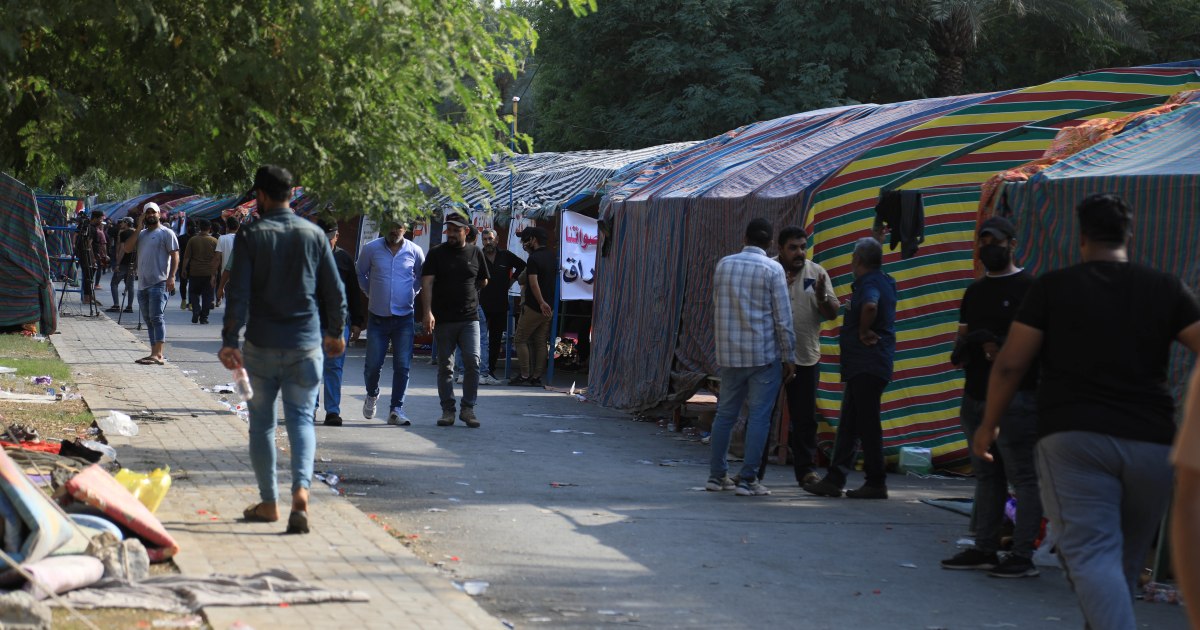Tribal leaders in central and southern Iraq demanded the re-run of the parliamentary elections, which were held on the tenth of this month, describing them as "rigged", while the Independent High Electoral Commission rejected the overwhelming majority of appeals against the results of the poll.
Tribal sheikhs from the central and southern governorates demanded - in a press conference they held in the sit-in square in Baghdad - the rerun of the elections and the continuation of the protests until their demands are met. State institutions, and a government that provides security and services to the Iraqi people, especially the center and the south, which suffer from deprivation and marginalization.
The demands of the clans come at a time when supporters of parties and forces rejecting the results of the recent legislative elections are continuing their sit-in in Al-Hassanin Square (central Baghdad) to demand a re-counting of votes manually.
The protesters' demand
Al-Jazeera correspondent in Baghdad, Samer Youssef, said that the sit-ins near one of the heavily fortified Green Zone gates insist on a main demand, which is the re-counting and sorting of votes manually throughout Iraq, and leaders in the coordinating framework - which brings together all Shiite forces except the Sadrist movement - say that 20% Some of the polling stations across Iraq were not counted, and their counting will change the results of the polls and the distribution of seats to the competing parties.
The sit-in entered its fourth day, amid expectations that additional numbers would flock to the square where tents and slogans calling for manual recounting and sorting were spread.
And Shiite forces - including influential factions - warned last week that proceeding with these results would threaten civil peace in the country, which raised fears of a possible outbreak of internal fighting.
On the other hand, the caretaker prime minister, Mustafa Al-Kazemi, said that demonstrating about the election results is a right guaranteed by the constitution, calling on the security forces to provide protection to the demonstrators, and to prevent those he described as infiltrators and terrorist groups from exploiting the loopholes, and Al-Kazemi stressed - in a speech during a meeting yesterday, Thursday with security leaders. - To protect the demonstrators who object to the election results in accordance with the constitutional and legal contexts.
Election Commission
The Electoral Commission said that it had accepted 7 appeals supported by evidence, distributed between Baghdad (2), Basra (1), Erbil (1) and Nineveh (3), out of 181 appeals submitted yesterday, Thursday. And the recommendation made, the Council recommended the dismissal of 174 appeals.
The statement added that 7 of the appeals were accepted, supported by evidence, and that in light of this, the contested electoral centers will be opened in accordance with the election law, and the votes will be counted and counted manually in the presence of representatives of the competing candidates according to dates, procedures and mechanisms to be determined later, and notified before an appropriate period.
According to the preliminary results of the legislative elections, the Sadrist bloc affiliated with Shiite leader Muqtada al-Sadr came first with 73 seats out of 329, while the "Progress" bloc led by dissolved Parliament Speaker Muhammad al-Halbousi won 38 seats, and the "State of Law" bloc ranked third. Led by former Prime Minister Nuri al-Maliki, 34 seats.
The "Al-Fateh" alliance - a political umbrella for the armed factions - is the most prominent loser in the recent elections, with 16 seats, after it came second with 48 seats in the 2018 elections.

